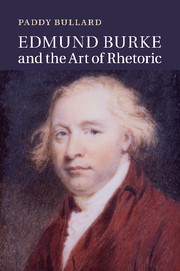Book contents
- Frontmatter
- Contents
- Acknowledgements
- Abbreviations
- Introduction: Burke, rhetoric and ethics
- 1 The ethical turn in early modern rhetoric, 1600–1760
- 2 Rhetoric in Ireland, 1693–1765
- 3 The Epicurean aesthetics of the Philosophical Enquiry
- 4 Episodes in the evolution of Burke's eloquence
- 5 Reflections on the Revolution in France and the rhetoric of character
- 6 Burke, Rousseau and the purchase of eloquence
- Conclusion
- Notes
- Bibliography
- Index
Conclusion
Published online by Cambridge University Press: 01 June 2011
- Frontmatter
- Contents
- Acknowledgements
- Abbreviations
- Introduction: Burke, rhetoric and ethics
- 1 The ethical turn in early modern rhetoric, 1600–1760
- 2 Rhetoric in Ireland, 1693–1765
- 3 The Epicurean aesthetics of the Philosophical Enquiry
- 4 Episodes in the evolution of Burke's eloquence
- 5 Reflections on the Revolution in France and the rhetoric of character
- 6 Burke, Rousseau and the purchase of eloquence
- Conclusion
- Notes
- Bibliography
- Index
Summary
In the introduction to this book I mentioned some of the problems of method that make analysing Burke's rhetoric such a complicated task. Should a study of Burke's rhetoric take in the full record of his parliamentary oratory, or focus on his printed publications? Should it look to the classical and humanistic theory of rhetoric as context for his art, or to contemporary seventeenth- and eighteenth-century criticism as a more valid set of intellectual sources? Should we investigate the reception history of Burke's writings and speeches for evidence of how they actually worked as persuasive compositions, or should we concentrate on internal evidence of his rhetorical strategies drawn from the texts themselves?
With each of these three sets of alternatives I have chosen to emphasize the second problem, while keeping an attentive eye on the first. This is because it is these second problems that allow us to get at the fundamental artistic coherence of Burke's rhetoric. Most readers will understand, after only a cursory perusal of, say, the Reflections on the Revolution in France, what people mean when they talk about ‘Burke's rhetoric’, however innocent they may be of the technical discourse of rhetoricians. Obviously enough, the phrase glances at the political context in which Burke's writings were published and his speeches made, and it acknowledges a more or less straightforward design to persuade.
- Type
- Chapter
- Information
- Edmund Burke and the Art of Rhetoric , pp. 194 - 200Publisher: Cambridge University PressPrint publication year: 2011



